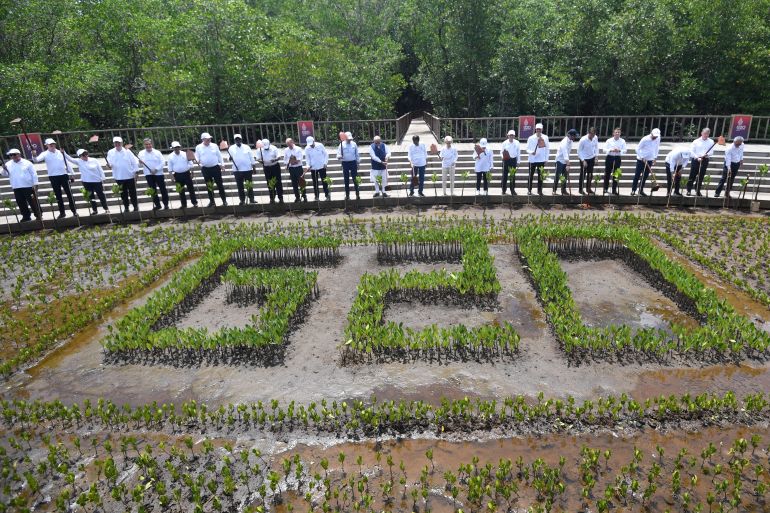The G20 risks becoming irrelevant
Unless it shows a commitment to tackling global crises, the group will lose its clout.

The global economy is besieged by soaring inflation and mounting debt, fuelled primarily by the climate emergency and Russia’s full-scale invasion of Ukraine. The need is urgent: the United Nations has identified 54 countries in need of debt relief which are home to nearly a fifth of the global population. More than half of them are the poorest nations in the world and the most vulnerable to climate change.
But instead of aiding emerging markets, the central banks of advanced economies are raising interest rates while international financial institutions are failing to provide sufficient relief, liquidity, or climate financing. Repetition of failed policies is causing turmoil in the Global South, but the group of the world’s 20 biggest economies, known as the G20, appears too paralysed by geopolitical disagreements to take concerted action.
At the latest G20 meeting in Bali, there was supposed to be one positive development: the official launch of the global pandemic preparedness fund hosted by the World Bank. This facility – funded by G20 members and other states – is intended to help governments and international organisations improve their readiness to tackle future pandemics and establish solid coordination mechanisms.
But the initiative has already been criticised for its limited scope and the inadequacy of funding – it has received just $1.4bn so far. Other global challenges – including the climate, food and economic crises – saw little action from the G20 in Bali.
It is increasingly hard to justify perpetuating the existing multilateral approach if the system cannot deliver for the most vulnerable. Why are these life-and-death decisions being put in the hands of the G20 if their summits conclude with so little to show?
To stay relevant, this intergovernmental forum must demonstrate that it is able to tackle the growing crises the world faces today.
One way to do this is to support UN Secretary-General Antonio Guterres’s proposed stimulus package to address the deteriorating situation for developing countries. It includes boosting debt relief and restructuring, enhancing lending from multilateral development banks (MDBs), bolstering liquidity support to counter capital flight and currency depreciation, and aligning financial flows with the Sustainable Development Goals (SDGs) and the Paris Agreement on climate change.
Another important initiative the G20 should back is the Bridgetown Agenda put forward by the prime minister of Barbados, Mia Mottley. It calls for high-income countries to immediately make available $100bn of unused Special Drawing Rights, which are international assets reserved for times of global economic hardship to boost the liquidity of low-income countries.
The Bridgetown Agenda also proposes the expansion of multilateral lending to governments to $1 trillion and suspending debt and interest payments for the already debt-distressed nations. It seeks to formalise new mechanisms for climate financing like the new funding for loss and damage proposed at COP27 and longer-term funding for clean energy in the Global South.
The G20 should also look into making progress on tax justice and it can start with overhauling an initiative it has already backed. Last year, it announced its support for the “Inclusive Framework” plan by the Organization for Economic Co-operation and Development (OECD) for a global minimum corporate tax of 15 percent.
The initiative was endorsed by 132 countries and jurisdictions and marked an important paradigm shift, but ultimately lacked the ambition to make a real difference.
It failed to curb profit shifting effectively and generate substantial revenues for lower-income countries most affected by corporate tax abuse. The substantial carve-outs afforded to multinationals and low-tax jurisdictions – combined with the exclusion of most developing countries from the decision-making process – did nothing to dispel the notion that the multilateral system is rigged against the poorest.
The G20 can change that. A good start would be the creation of a secretariat for the Inclusive Framework that would better represent developing countries and emerging markets and their needs and concerns. Furthermore, different stages of the decision-making process should be subjected to votes and proceedings open to the public. Increased scrutiny is vital and should limit wealthy nations from making decisions about developing countries above their heads.
The G20 cannot avoid addressing key structural issues and should listen carefully to these ideas emanating from other fora. Debt relief is important, but it amounts to a mere sticking plaster without tackling climate change and tax justice, which act as an anchor for developing countries’ finances.
The group also has to be more inclusive, representing the interests of not just big economies. Importantly at the meeting in Bali, some member states endorsed the candidacy of the African Union to become part of the G20 – a much-needed and important step.
In 2023, the G20 “troika” (comprised of the current, former and future hosts) will be India, Indonesia, and Brazil. In 2025, South Africa will host. This unprecedented succession of emerging market economies holding the G20 presidency could present a valuable opportunity to amplify the voice of the Global South.
It would be a powerful symbol if countries with recent experiences of debt and poverty could set the agenda on addressing social and climate challenges. But it would be the ultimate shame if the most powerful economies bequeath a system as fractured and sluggish as now.
The views expressed in this article are the author’s own and do not necessarily reflect Al Jazeera’s editorial stance.
